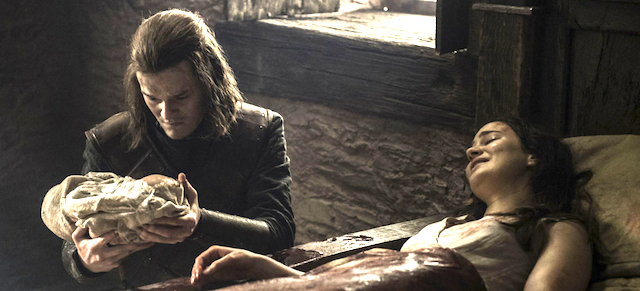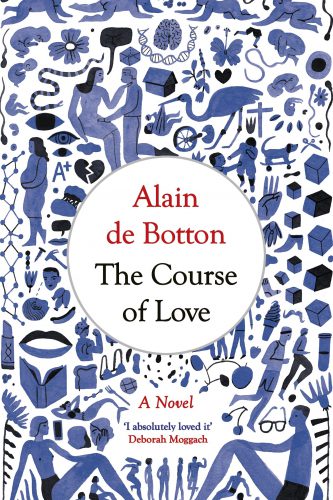
Chalk it up to feeling a bit sentimental as my wife and I enter the final stretch of waiting for baby number three (most likely our last prenatal go-round). Or maybe it has to do with the increasing number of conversations I’ve been having with young couples perplexed by why anyone would ever want to reproduce, given the obvious insanity of the contemporary parenting treadmill and the (largely recreational) venting that occupies so much online real estate. Or perhaps it’s that I’m trying to think of something to say this Sunday about Naaman, the leper-warrior who, at the prophet Elisha’s behest, begrudgingly “went down and dipped himself seven times in the Jordan… and his flesh was restored like the flesh of a little child, and he was clean” (2 Kings 5:14). Who knows, could be down to the fact that VBS just wrapped up, and the phrase “children of god” is still ringing in my ears. Whatever the case, the following quote from Alain de Botton’s new ‘novel’, The Course of Love, brought a tear to the eye:
Children may end up being the unexpected teachers of people many times their age, to whom they offer–through their exhaustive dependence, egoism, and vulnerability–an advanced education in a wholly new sort of love, one in which reciprocation is never jealously demanded or fractiously regretted…
Children teach us that love is, in its purest form, a kind of service. The word has grown freighted with negative connotations. An individualistic, self-gratifying culture cannot easily equate contentment with being at someone else’s call. We are used to loving others in return for what they can do for us, for their capacity to entertain, charm, or soothe us. Yet babies can do precisely nothing. There is, as slightly older children sometimes conclude with serious discomfiture, no “point” to them; that is their point. They teach us to give without expecting anything in return, simply because they need help badly–and we are in a position to provide it. We are inducted into a love based not on an admiration for strength but on a compassion for weakness, a vulnerability common to every member of the species and one which has been and will eventually again be our own. Because it is always tempting to overemphasize autonomy and independence, these helpless creatures are here to remind us that no one is, in the end, “self-made”: we are all heavily in someone’s debt. We realize that life depends, quite literally, on our capacity for love.
We learn, too, that being another’s servant is not humiliating–quite the opposite, for it sets us free from the wearying responsibility of continuously catering to our own twisted, insatiable natures. We learn the relief and privilege of being granted something more important to live for than ourselves.
https://www.youtube.com/watch?v=GEbZrY0G9PI

COMMENTS
3 responses to “What Children Teach Us About Love (and God)”
Leave a Reply














David, I loved this so much! How “interesting” that just this morning I was reading in a book that one of my husband’s hospice clients had passed on to him (I found it in the back of his car and it looked like something I would like). I read these words, just a couple of hours ago in Finding My Way Home, by Henri Nouwen:
“God does not want us to be afraid, distant, or envious. God wants us to come close, very close, so close that we can rest in the intimacy of God as children in their mother’s arms.
Therefore, God became a little baby. Who can be afraid of a little baby? A tiny little baby is completely dependent on its parents, nurses, and caregivers. Yes, God wanted to become so powerless as to be unable to eat or drink, walk or talk, play or work without many people’s help. Yes, God became dependent on human beings to grow up and live among us and proclaim the good news. Yes, indeed, God chose to become so powerless that the realization of God’s own mission among us became completely dependent upon us….God became human…to break through the walls of power in total weakness. That’s the story of Jesus.”
David,
Thank you so much for this. I have lived this in parenting my two sons. The first was raised in a harsh law driven fashion with me trying to break his will and make him obey my commands.(spankings included) My second son, sadly after learning through experimentation on my first son, was raised in a much more grace filled environment.(never spanked by me) The differences in the two could not be more pronounced. My first son is now a Marine which is a natural outflow of his childhood. They did however give him the confidence that I denied him. My second son will be a senior in high school this year and is gregarious, confident, and very loving. I guess you could call it the tale of two sons. I know this parenting is a mystery and we are taught much more by our children than we ever teach them.
Thank you for this lovely piece! My second baby is two weeks old today. I never anticipated the relief that would coincide with motherhood. This really hit home: “We learn, too, that being another’s servant is not humiliating–quite the opposite, for it sets us free from the wearying responsibility of continuously catering to our own twisted, insatiable natures”. Exactly… For all the sleepless nights, fears and frustrations that parenthood brings, nothing has brought me quite the freedom from self in such a profound way as the experience of caring for a newborn/baby. I know it’s possible to experience this without being a parent, but for me this has happened most significantly through becoming a parent. Loving and caring for such a vulnerable being is so overwhelming that even my most self absorbed parts have had to take a back burner (at least temporarily) – and thank goodness! What an unexpected gift, in addition to the sheer cuteness and joy that comes with a new baby. Praying for you and your family as you await your new addition!